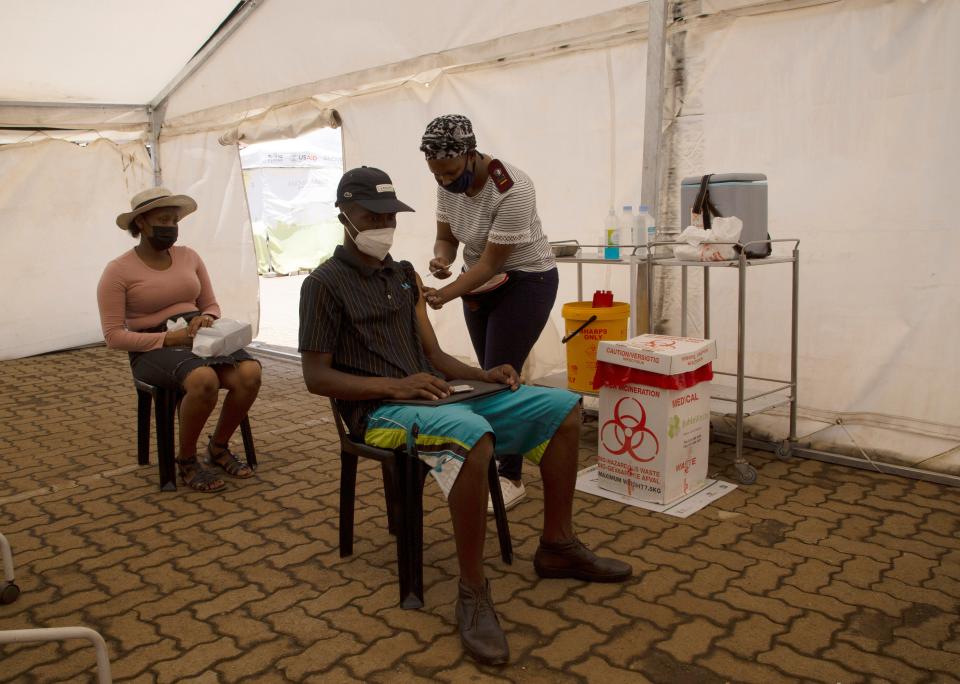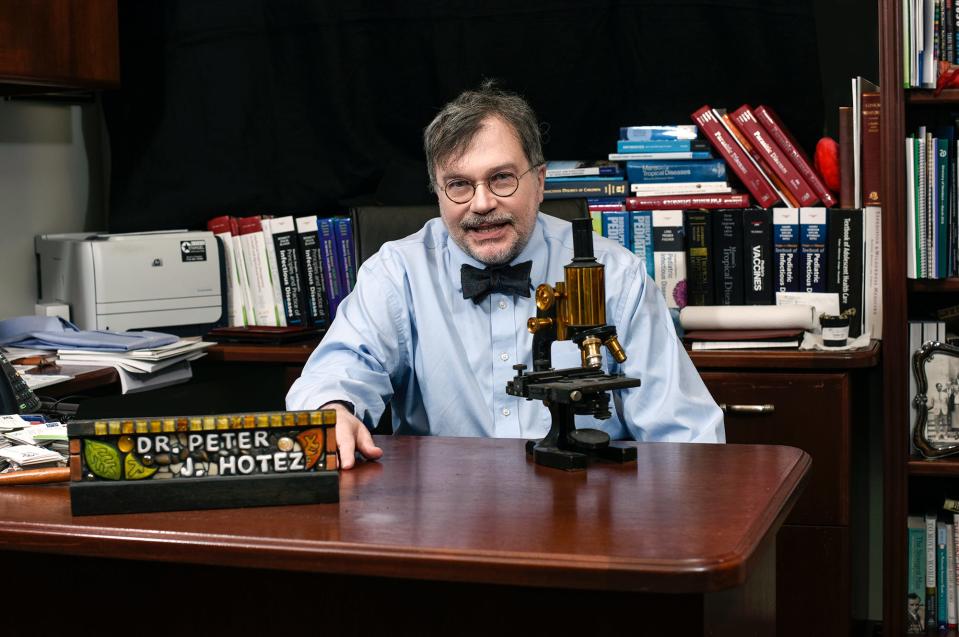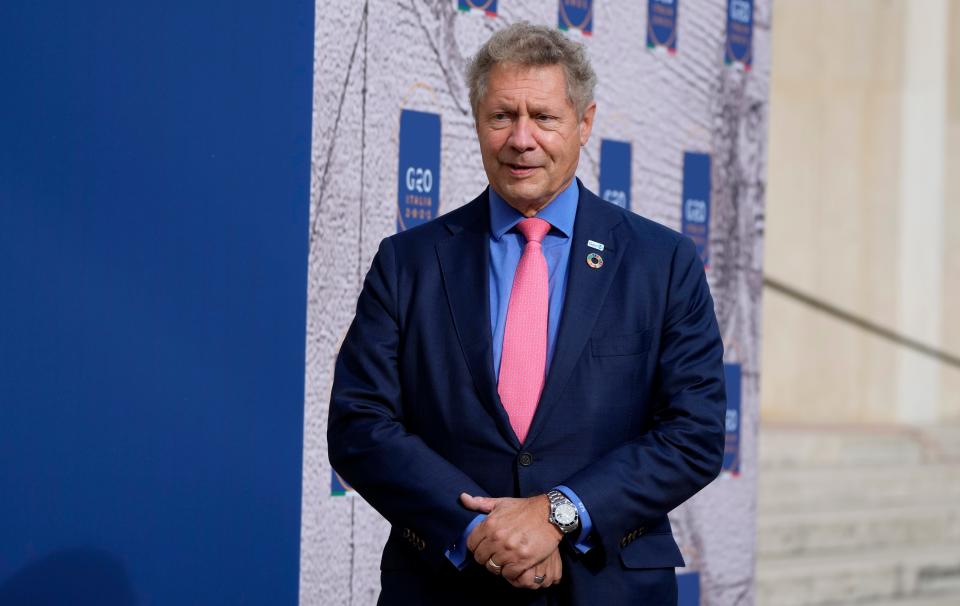Omicron isn't a surprise to advocates who have fought for global vaccine equity
- Oops!Something went wrong.Please try again later.
As the new omicron coronavirus variant spreads across the world, advocates of more widespread vaccinations are having an "I told you so" moment.
For a year since COVID-19 vaccines first became available, a small but vocal group has warned about the need to protect the most vulnerable around the world.
People in richer countries will not be safe, even if fully vaccinated, until those in poorer nations – which make up more than half the world's 8 billion population – also have the benefit of vaccines, they've argued.
But the response from wealthier nations has been slow.
The United States has pledged more doses than any other country to lower and middle-income nations, and according to President Biden has "shipped for free more vaccine than all other countries in the world combined."
Yet, fewer than one-quarter of the 1.2 billion vaccine doses donated by the U.S. have been delivered.
The result has been predictable, advocates say.
“The emergence of the omicron variant has fulfilled, in a precise way, the predictions of the scientists who warned that the elevated transmission of the virus in areas with limited access to vaccine would speed its evolution," Dr. Richard Hatchett, told a special session of the World Health Assembly this week.

With vaccines reaching fewer than a quarter of people in Botswana and South Africa – where omicron was first detected – both countries "provided a fertile environment for such evolution," said Hatchett, head of the Coalition for Epidemic Preparedness Innovations, a foundation that works to develop vaccines against emerging infectious diseases.
"The virus is a ruthless opportunist; and the inequity that has characterized the global response has now come home to roost."
Among richer countries, many, like the United States, have fully vaccinated 60% of their population or more.
Elsewhere in the world, the rates are much lower, and many of those who have been vaccinated received shots of "uncertain quality," not the ones used on Americans and Europeans, according to Dr. Peter Hotez, an expert in pediatric infectious diseases at Baylor College of Medicine and Texas Children’s Hospital, both in Houston.

"Look at how badly we're doing," he said, noting that only about 40% of Southeast Asians, 30% of Middle Easterners, 50% South and Latin Americans and only a fraction of the African continent's 1.2 billion residents has received high-quality vaccines.
"We're not vaccinating the Southern Hemisphere," he said.
American self-interest
It's in America's self-interest to protect everyone, Biden and others say.
"We can't let up until the world is vaccinated. We're protecting Americans by doing that," the president said Monday. Still, he emphasized that none of the doses going to other countries will "come at the expense of any American."
The U.S. was slow at the start, but "has been terrific" lately, said Seth Berkley, CEO of Gavi, the Vaccine Alliance, a public–private global health partnership.
Now, Berkley said at a recent webinar for the Center for Strategic and International Studies, "the challenge is to make sure it doesn't end up a U.S. thing." Other countries need to step up with vaccine donations, he said. "We want the U.S. to use its diplomatic skills to bring others along."

The path of omicron shows that Americans are vulnerable no matter where a new, more dangerous variant first appears.
"The idea that you can just put up walls, you can stop flights and you can stop viruses is based on wishful thinking and not science," said Dr. Richard Besser, president and CEO of the Robert Wood Johnson Foundation, a health philanthropy.
Even if omicron turns out to be harmless, other variants are likely to keep emerging unless the virus is contained by vaccination and social measures, he said.
"Whether or not you think we should do it for ethical and moral reasons," Besser said, "out of pure self-interest, if we don't do more to vaccinate the world, we will pay the price."
In addition to enabling the virus to mutate, infections also disrupt the supply chain of products in the U.S., said Dr. Marcus Schabacker, president and CEO of ECRI, an independent nonprofit focused on health care safety, quality, and cost-effectiveness.
For instance, raw materials and rare metals that come from Africa will be stalled if infection rates are high or key people are sickened there, said Schabacker, who spent several years working in rural parts of the continent.
'The last mile'
Delivering vaccines is just the first step, Schabacker said. There's also the "last mile problem" of getting vaccines to rural areas with limited capacity for storage and distribution.
Jeff Zients, the White House's coronavirus response coordinator, said in a Tuesday news conference that the U.S. has been helping "turn vaccines into vaccinations."
The government has spent $1.6 billion in sub-Saharan Africa during the pandemic, launching mobile vaccination clinics, building field hospitals, training health care workers, designing data systems to track vaccination campaigns and deploying media efforts to educate people on the importance of vaccination, he said.
Vaccine hesitance remains a major problem around the world.
"We're not doing a good job of exporting vaccines – but we're doing a pretty good job of exporting vaccine hesitancy," Besser said.
Thanks to social media and aggressive anti-vaccination campaigns, he said, people in many countries, including in southern Africa where omicron is believed to have emerged, have begun to doubt the safety and effectiveness of COVID-19 vaccines.

In his Monday speech, Biden said South Africa does not need any more vaccine doses at the moment, in part because of vaccine hesitancy. "We have provided significant vaccines to South Africa and that region," he said, noting that the country was having trouble distributing vaccines and that not enough people there are getting vaccinated.
Dr. Anthony Fauci, the president's chief medical adviser, said at Tuesday's news conference that several countries in southern Africa and elsewhere "have told us not to ship any more vaccine because they have not been able to adequately utilize it."
Global vaccination efforts
For the past year, a consortium of global organizations has been collecting donated vaccine doses and helping low- and moderate-income countries prepare for vaccination campaigns.
Gavi was successful early on – delivering the first COVID-19 vaccine doses to low-income countries just 38 days after the first dose was delivered in the United Kingdom. So far, Gavi has delivered 582 million doses to 144 countries.
But the effort has been slowed by "vaccine nationalism," Berkley said at the recent talk. Gavi had initially hoped to provide 950 million doses this year to lower-income countries to cover those most at risk.
Because contracts between countries and vaccine makers haven't been made public, it's not clear if slowdowns in manufacturing are affecting all customers equally, a Gavi spokesperson said, or if companies are prioritizing supply to rich nations.
High income countries could trade places in manufacturers’ queues with COVAX, a distribution arm run by Gavi, so lower-income participants can receive doses earlier. Gavi has been calling on manufacturers to be more transparent about when they will make doses available, for higher-income countries to “slot swap,” and for donor governments to give better notice as to the number and timing of their donations, the spokesperson said.
Gavi hopes supply issues will stabilize by the middle of next year.
Between the need for boosters and addressing variants, there's "an enormous amount of uncertainty going forward," Berkley said. "There are unknowns upon unknowns upon unknowns.”
The role of vaccine makers
Very few of the donated doses have come from Moderna or Pfizer-BioNTech, the vaccines most Americans have received.
Pfizer-BioNTech provided just 1.2 million doses to Gavi in the first half of this year and 40 million total in 2021, Berkley said.
Moderna recently began providing 13 million doses of its vaccine to COVAX and in late October, the company struck a deal to provide up to 116.5 million doses in the second quarter of 2022.
Berkley said he didn't aggressively pursue doses of Moderna or Pfizer-BioNTech early in the pandemic because both vaccines were unproven, and Pfizer-BioNTech's needed to be kept frozen at super-cold temperatures. Many low-income countries don't have ultra-cold freezer capacity.
Novavax, which had planned to help vaccinate the world, has been slow to ramp up. It won approval in November to begin offering its vaccine for the first time – so far just in Indonesia and the Philippines.
Operation Warp Speed, a Trump administration effort that funded and helped develop vaccines, prioritized technologies that could be developed quickly – like the Pfizer-BioNTech and Moderna shots – over those that could be manufactured at large scale for low cost, Hotez said.
"The global policy makers couldn't understand that when you focus exclusively on speed and innovation, you're not going to achieve your goal of vaccine equity," he said.
Hotez is helping Texas Children's and Baylor develop a low-cost, easy-to-produce and store vaccine that he hopes will make a difference in low- and moderate-income countries.
He's been frustrated by the lack of government support to scale up the vaccine, which is based on older and more proven technology. He's hoping it will soon be released in India, and – with a greater commitment from wealthy nations – many more countries.
"If the stars align, we could completely vaccinate the world by the first or second quarter of 2022 – which is what we need to do," he said.
Contact Karen Weintraub at kweintraub@usatoday.com.
Health and patient safety coverage at USA TODAY is made possible in part by a grant from the Masimo Foundation for Ethics, Innovation and Competition in Healthcare. The Masimo Foundation does not provide editorial input.
This article originally appeared on USA TODAY: Covid vaccines for poor countries critical in fight against omicron

